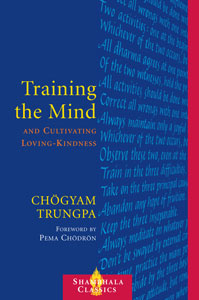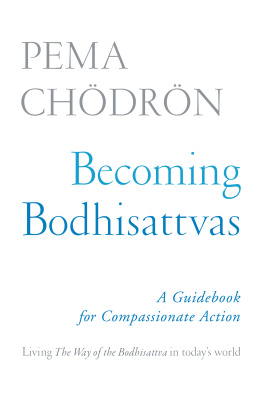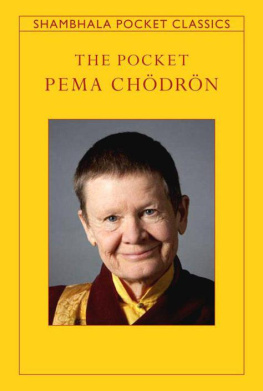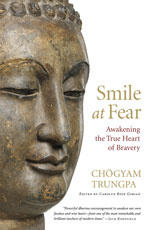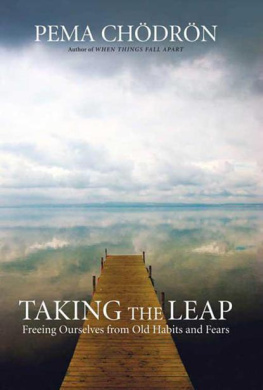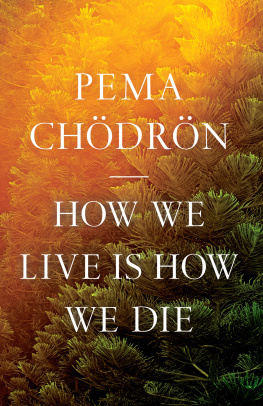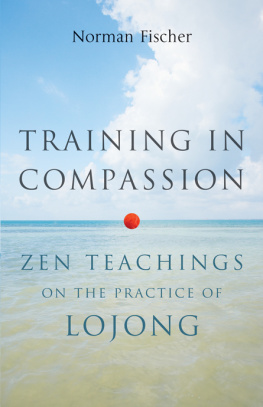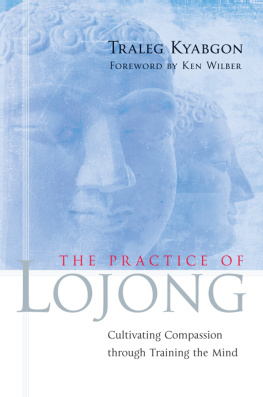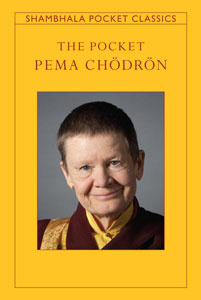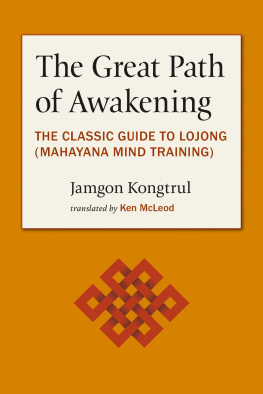Pragmatic and to the point, Pema Chdrn cuts to the very heart of practice, right to the tender pink spot we want to cover over and keep safe. In the context of being kind to ourselves, Start Where You Are shows how our greatest asset is our own vulnerability that we so desperately protect. Pema Chdrn guides us to the understanding that, rather than hiding from or resisting the pain of our existence, we can learn to relax with the situation just as it is.
Tantra magazine
Pema Chdrn uses modern Western idiom and lyrical language to bring to life ancient Buddhist Wisdom. She weaves a poetic tapestry which invites the reader onto a path of compassionate living which is both new and familiar.
Loch Kelly, M. Div., C.S.W.
Gives down-to-earth instructions for walking the Buddhist talk of compassion.
Shambhala Sun
As one of Pema Chdrns grateful students, I have been learning the most pressing and necessary lesson of all: how to keep opening wider my own heart.
Alice Walker
ABOUT THE BOOK
Start Where You Are is an indispensable handbook for cultivating fearlessness and awakening a compassionate heart. With insight and humor, Pema Chdrn presents down-to-earth guidance on how we can start where we areembracing rather than denying the painful aspects of our lives. Pema Chdrn frames her teachings on compassion around fifty-nine traditional Tibetan Buddhist maxims, or slogans, such as: Always apply only a joyful state of mind, Dont seek others pain as the limbs of your own happiness, and Always meditate on whatever provokes resentment.
Working with these slogans and through the practice of meditation, Start Where You Are shows how we can all develop the courage to work with our inner pain and discover joy, well-being, and confidence.
PEMA CHDRN is an American Buddhist nun in the lineage of Chgyam Trungpa. She is resident teacher at Gampo Abbey in Nova Scotia, the first Tibetan monastery in North America established for Westerners. She is the author of many books and audiobooks, including the best-selling When Things Fall Apart and Dont Bite the Hook.
Sign up to receive inspirational quotes from Pema Chdrn and special offers from Shambhala Publications.

Or visit us online to sign up at shambhala.com/eheartadvice.
Start Where You Are

A GUIDE TO
COMPASSIONATE LIVING
PEMA CHDRN

SHAMBHALA
Boston
2011
S HAMBHALA P UBLICATIONS, I NC.
Horticultural Hall
300 Massachusetts Avenue
Boston, Massachusetts 02115
www.shambhala.com
1994 by Pema Chdrn
Translation of The Root Text of the Seven Points of Training the Mind 1981, 1986 by Chgyam Trungpa; revised translation 1993 by Diana J. Mukpo and the Nlnda Translation Committee. TheSdhana of Mahmudr 1968, 1976 by Chgyam Trungpa.
All rights reserved. No part of this book may be reproduced in any form or by any means, electronic or mechanical, including photocopying, recording, or by any information storage and retrieval system, without permission in writing from the publisher.
The authors proceeds from this book will be donated to Gampo Abbey,Pleasant Bay, Nova Scotia, Canada B0E 2P0.
The Library of Congress catalogues the previous edition of this title as follows:
Chdrn, Pema.
Start where you are: a guide to compassionate living/Pema Chdrn.1st ed.
p. cm.
Includes bibliographical references.
eISBN 978-0-8348-2116-3
ISBN 978-0-87773-880-0
ISBN 978-1-57062-839-9
ISBN 978-1-59030-142-5
1. Spiritual lifeBuddhism. 2. BuddhismChinaTibetDoctrines.
I. Title.
BQ7805.C49 1994 93-39135
294.3444dc20 CIP
To my mother, Virginia, and my granddaughter, Alexandria
CONTENTS
PREFACE
T HIS BOOK is about awakening the heart. If you have ever wondered how to awaken your genuine compassionate heart, this book will serve as a guide.
In our era, when so many people are seeking help to relate to their own feelings of woundedness and at the same time wanting to help relieve the suffering they see around them, the ancient teachings presented here are especially encouraging and to the point. When we find that we are closing down to ourselves and to others, here is instruction on how to open. When we find that we are holding back, here is instruction on how to give. That which is unwanted and rejected in ourselves and in others can be seen and felt with honesty and compassion. This is teaching on how to be there for others without withdrawing.
I first encountered these teachings in The Great Path of Awakening by the nineteenth-century Tibetan teacher Jamgn Kongtrl the Great. Called the lojong teachings, they include a very supportive meditation practice called tonglen and the practice of working with the seven points of mind training, which comes from an old Tibetan text called The Root Text of the Seven Points of Training the Mind, by Chekawa Yeshe Dorje. (See appendix.)
Lojong means mind training. The lojong teachings are organized around seven points that contain fifty-nine pithy slogans that remind us how to awaken our hearts. Working with the slogans constitutes the heart of this book. These teachings belong to the mahayana school of Buddhism, which emphasizes compassionate communication and compassionate relationship with others. They also emphasize that we are not as solid as we think. In truth, there is enormous space in which to live our everyday lives. They help us see that the sense of a separate, isolated self and a separate, isolated other is a painful misunderstanding that we could see through and let go.
Tonglen means taking in and sending out. This meditation practice is designed to help ordinary people like ourselves connect with the openness and softness of our hearts. Instead of shielding and protecting our soft spot, with tonglen we could let ourselves feel what it is to be human. By so doing, we could widen our circle of compassion. Through this book I hope others may find such encouragement.
When I first read the lojong teachings I was struck by their unusual message that we can use our difficulties and problems to awaken our hearts. Rather than seeing the unwanted aspects of life as obstacles, Jamgn Kongtrl presented them as the raw material necessary for awakening genuine uncontrived compassion: we can start where we are. Whereas in Kongtrls commentary the emphasis is primarily on taking on the suffering of others, it is apparent that in this present age it is necessary to also emphasize that the first step is to develop compassion for our own wounds. This book stresses repeatedly that it is unconditional compassion for ourselves that leads naturally to unconditional compassion for others. If we are willing to stand fully in our own shoes and never give up on ourselves, then we will be able to put ourselves in the shoes of others and never give up on them. True compassion does not come from wanting to help out those less fortunate than ourselves but from realizing our kinship with all beings.
Later I heard these instructions presented in a more contemporary mode by my own teacher, Chgyam Trungpa, Rinpoche. (These have now been published in the book Training the Mind and Cultivating Loving-Kindness.)
Next page
